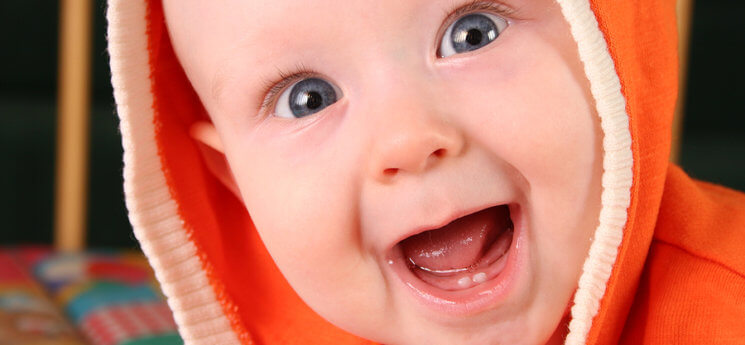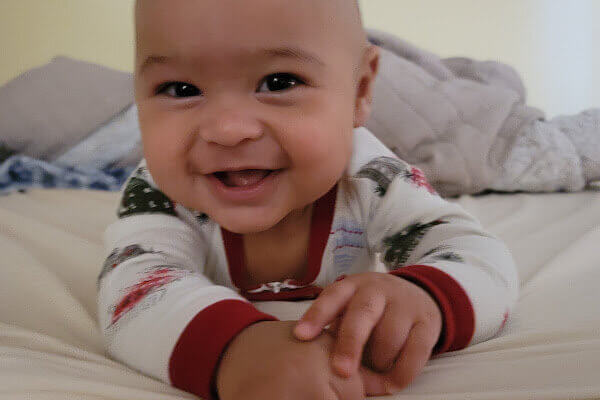You have so many dreams for your newborn baby. More than anything, you want her to become a happy, healthy adult. How can you know which of your parenting practices will be good for her in the long run? Which habits will influence her the most?
Darcia Narvaez, PhD, is a Notre Dame psychology professor whose research focuses on the character development of children. Her studies have shown that certain infant-rearing habits produce children (and adults) who are calmer, happier and more empathetic, and have higher IQs.
But Narvaez is concerned that we seem to be moving away from the very customs that produce emotionally healthy kids and adults. “The way we raise our children here in America seems to deprive them of the practices that lead to their future well-being.”
Other experts agree. “One of the most important messages for new mothers is that being a responsive parent now can prevent mental health issues later in life,” explains Karam Radwan, MD, director of the Child and Adolescent Psychiatry Training Program at the University of Chicago School of Medicine. “This isn’t a theory anymore-it’s evidence-based science.”
Just what are these “magical” parenting practices? You’ll be amazed to learn that they’re pretty intuitive. They involve a lot of TLC-and a little more effort. They include tossing out inflexible schedules and being less rigid-about everything from nursing to naptime. But the returns are invaluable.
The well-known pediatrician William Sears, MD, calls it “attachment parenting,” a style of mothering that builds a baby’s trust as well as the foundation for her to become a responsible, contented adult. “Being able to trust is what makes this a beautiful world to live in,” says Dr. Sears.
Here are the infant-rearing practices on how to have a happy baby.
1. Give lots of positive touch
When you cuddle, carry, hold and wear your baby in a front pack or sling, good things happen. “Touch helps your infant’s body regulate temperature and digestion,” says Narvaez. “It also stimulates production of the social hormone oxytocin-in both mom and baby-which increases the pleasure we get from being with other people.”
A prime example of the power of touch can be best explained by what happens when babies are physically neglected. Researchers at the University of Wisconsin-Madison studied children who had lived in Russian and Romanian orphanages before being adopted into stable homes in the U.S.
They discovered that due to the absence of loving contact during infancy, the children had emotional problems and abnormal levels of the social-bonding hormones vasopressin and oxytocin-many years later. “These children were not touched and they failed to thrive,” says Narvaez.
Dr. Sears is a huge advocate for wearing your baby-in a front pack or sling-to reap the myriad advantages of positive touch. In his many decades of practice and research, Sears has found that babies who are worn cry less, stay calmer, get socialized faster and learn about the outside world more quickly. “Without positive touch, infants will become adults who lack intimacy and empathy,” says Sears. “And these are the hallmarks of bullies and criminals.”
2. Respond quickly to your baby’s cries and fusses
Forget what you may have learned from old Dr. Spock books, the Ferber Method or any of the other advocates of the let-baby-cry-it-out school. Crying is a sign of communication-not manipulation. It means your baby needs something (most likely you!) and responding quickly to his needs builds his trust in you.
“If you ignore your baby, you might be teaching him that the world is frightening, that he’s not needed, that he doesn’t matter,” says Radwan. “When you don’t respond quickly, he won’t understand that mom may be busy or tired.”
When a baby’s cries are unanswered, high levels of stress hormones (like cortisol) flood his brain, which drain his resilience and damage cells in his developing gray matter, according to new research published in the journal Biological Psychiatry. The baby will believe that his cry-his only form of communication-has no value to you, his caretaker. And this can have a lifelong negative effect on his attachment relationships with others, say researchers.
“Responsive parenting, on the other hand, promotes healthy emotional and physical growth and better control of emotions as he grows,” says Radwan. A baby whose cries are answered quickly and with sensitivity will be less aggressive and impulsive, make more friends and perform better academically when he’s older. “Its benefits are most valuable in terms of preventive medicine,” adds Radwan. “Being responsive will have an enormous effect on your child’s physical and emotional health in his future.”
3. Nurse frequently and for as many months as possible
Narvaez is concerned that American culture may be deviating from the traditional practices that foster healthy emotional growth in children. And she is especially concerned about breastfeeding. In the latest report from the Centers for Disease Control, only 22 percent of babies are still being breastfed by the time they’re 12 months old. This may be due to everything from insufficient prenatal education and early hospital discharge (where mom learns how to nurse) to lack of role models (who can also teach her) and commercial promotion of baby formula.
This is unfortunate because breastfed babies-in addition to being physically healthier than formula-fed babies-show greater neurodevelopment and perform better on tests of cognitive development. “They also gain a sense of competence,” says Narvaez. “Sucking is hard, and with breastfeeding, a baby learns that she can do something powerful.”
Because of the close contact with mom, breastfed babies make eye-to-eye contact more frequently than bottle-fed infants and, hence, start to connect emotions with facial expressions. “This is how kids learn to interpret nonverbal communication,” says Radwan.
“This is very important to learn early in life because much of our adult interaction is nonverbal.” Experts say that breastfed babies are calmer, too, because they are getting their nutritional needs met while also being touched and caressed. The more you breastfeed, the more secure your baby will be.
4. Sleep near your baby
Even though the practice is discouraged in the U.S., parents in many non-Western cultures sleep with their babies every night. Why? “Babies who sleep next to their parents thrive,” says Dr. Sears. “They grow to their potential not just physically, but emotionally and intellectually as well.”
In his pediatric office, Dr. Sears keeps a file called “Kids Who Turned Out Well-What Their Parents Did.” He noticed that the babies who slept with their parents during infancy and/or toddlerhood were not only emotionally healthier, but also more connected to their parents.
Experts surmise that the extra touch and nighttime feedings promote positive mental development. “Babies seek mom for comfort,” says Radwan. “Having mom close at night keeps them from being overwhelmed by everything that’s new to them.” Room-sharing encourages breastfeeding, helps mom get her sleep in sync with her baby’s and allows infants to fall asleep more easily.
But here’s the rub: The American Academy of Pediatrics warns against bed-sharing because it can be dangerous for the infant. “Bed-sharing is one of the biggest big controversies around,” says Sears.
“My advice is to ‘co-sleep’ rather than bed-share, meaning that mom and baby sleep within easy reach of each other for the first year or two.” Sears suggests using a product called a co-sleeper, a bassinet that attaches to the parent’s bed. This way, your baby will still be within easy reach for nursing and comforting, and he won’t be separated from you during the night.
5. Finding a Balance
Don’t stress. These infant-rearing practices are not must-dos, 24/7. Pick and choose which of these parenting behaviors fit into your family’s lifestyle, and be consistent. “Sensitive parenting is not about devoting more time,” says Karam Radwan, MD, director of the Child and Adolescent Psychiatry Training Program at the University of Chicago School of Medicine. “It’s really about making the most of the precious time you do spend with your infant.”
We know you’re inundated with parenting advice-from relatives, books, friends, pediatricians and magazines (like ours). When you receive conflicting opinions or you’re in doubt about what to do, trust your instincts.
“The most important thing I tell new parents is to put themselves in the baby’s place,” says William Sears, MD (aka Dr. Sears), author of more than 40 books on childcare and associate clinical professor of pediatrics at the University of California, Irvine, School of Medicine. “Then ask yourself, ‘How would you want your mother to react?‘”
6. What We Can Learn From Primitive Cultures
Why do we become so attached to our babies? One word: evolution. “Attachment is useful,” says Radwan. “If mom or the caregiver is not responsive to her baby’s needs, the infant is not going to survive.” All mammals have very pronounced attachment procedures.
In foraging cultures, human babies are nursed frequently (and usually for two to five years), touched or kept near mom or another caretaker constantly, sleep with their parents and get an almost instant response to their cries.
When Melvin Konner, MD, PhD, a professor of anthropology and behavioral biology at Emory University in Atlanta, was studying the Bushmen of southern Africa, he noted that it was rare for a baby to cry for more than five seconds before somebody responded.
“The mother then breastfeeds the baby, usually several times an hour,” says Konner, whose new book The Evolution of Childhood (Harvard University Press, 2010) explains how mental development is rooted in the human ability to attach to one another.
Konner once told a Bushmen mother that some Americans believe that picking up a baby every time it cries would spoil the child. “She asked, ‘Don’t they realize it’s a baby and that’s why it cries? When it gets older, it won’t cry anymore,‘” says Konner. This represents a profound difference in parenting theories between hunter-gatherers and more developed cultures. This tribal mom believes that her baby will outgrow his crying and that responding each time will comfort him, not spoil him.
The moral? “Babies grow out of their undesirable behaviors,” says Konner. “It’s good to believe in the growth process, rather than you trying to control everything.”




